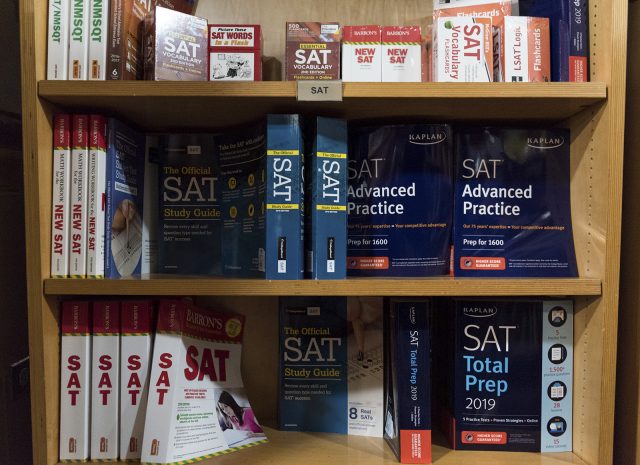While college students grieve the loss of their spring quarters, the novel coronavirus pandemic has put important high school milestones on hold, too.
However, there is one event hiatus that no high school student will bemoan – the cancellation of college entrance exams.
The College Board canceled the SAT originally scheduled for May 2, and although the June 6 edition of the SAT is still currently proceeding as planned, every day the country remains on lockdown decreases the likelihood that the exam will take place.
The University of California system has decided to circumvent the problem of canceled exams altogether. In a press release from April 1, the coalition of campuses announced that it will forgo the standardized testing requirements for fall 2021 freshman applicants.
But what high schoolers want to do and what they need to do aren’t always aligned – and the UC should know that better than anyone.
The world is facing an unprecedented event and many people are experiencing uncertainty in their everyday lives. But removing standardized testing from admissions requirements for a year will, if anything, only add to that uncertainty. Standardized testing is an essential aspect of the admissions process that could easily be converted to an online format to preserve the integrity of UC admissions.
UCLA spokesperson Ricardo Vazquez said in an emailed statement that the UC admissions process uses Comprehensive Review, 14 faculty-approved criteria, to consider applicants holistically.
“If a student does not submit standardized test scores, readers will evaluate students based on the other thirteen elements of the application,” Vazquez said in the statement.
The UC-wide decision to waive the standardized testing requirement provides another avenue for implicit bias to sneak in, potentially helping students who have already taken standardized tests over their fellow applicants. These students will have a more complete application and, in a time when many students won’t even have an SAT or ACT score to tout, those who do could appear more proactive than the applicants who waited to take tests that are now canceled.
Beyond that, the admissions criteria doesn’t provide a comprehensive way to compare students who attend different schools. An admissions officer can look at GPA and coursework, but curriculums and grading scales differ from school to school.
Entrance essays level the playing field in the same way standardized tests do, but they provide an extremely polished and revised version of an applicant. An equalizing standardized test can be retaken and improved upon, but cannot be touched up by revisionists and overly helpful high school teachers.
The UC system couldn’t come up with a new category to replace standardized testing because there isn’t one. And with no end in sight to social distancing, it’s time for the College Board to begin moving the test online.
The software to mitigate cheating on these exams already exists. Not to mention, higher level standardized tests like the LSAT and GRE already exist in an online format.
Moving the test online could affect access, but the digital age has put some sort of device in almost every hand in the United States. According to Pew Research Center polling data from 2019, 74% of American adults have a desktop or laptop computer of some kind. And with all that money saved on pen and paper test-taking materials, the College Board could direct funding toward providing technology loans or grants for students without access.
It’s unlikely that test scores would be affected by the move online either.
Li Cai, the director of the National Center for Research on Evaluation, Standards and Student Testing and professor at the UCLA Graduate School of Education and Information Studies, said that, while not conclusive, some studies have shown that the difference between in-person test scores and online test scores is very slim.
“In some cases, there were studies suggesting that these delivery mode differences are negligible, and indeed, based on that, many of the assessment programs have moved entirely online,” Cai said.
With tests and testing platforms already moving online to keep up with the digital age, doing the same with the SAT isn’t just a temporary fix. Instead, it could be a move toward the future of testing – one in which students could take the exam on their own schedule in a comfortable environment.
Some students believe that standardized tests shouldn’t just be put on hold but permanently eradicated altogether.
Alaire Kanes, a first-year undeclared student, saw the effect social inequality had on her peers’ scores during high school.
“If kids and their parents could afford tutoring, then they were destined to do pretty well on tests like the ACT and the SAT,” Kanes said.
Kanes isn’t wrong. Income does affect SAT and ACT scores, and a person with money can pay for better tutoring, which leads to better results. Especially in the current economic climate, tests geared toward higher-income students seem increasingly unfair.
This doesn’t just end with standardized testing, though. Parents with higher incomes can also afford to pay for private tutors. Higher-income students can participate in more extracurriculars, while their disadvantaged classmates may need to work a job to support their families. The entire college admissions process, not just the standardized testing portion, gives students with higher incomes an advantage.
The fact still stands that standardized tests help admissions officers distinguish between candidates. They are an important part of the process, and such highly criticized flaws are only a symptom of the larger inequalities in our public education system.
But until a complete overhaul of inequities in higher education comes along, standardized testing should be here to stay.

